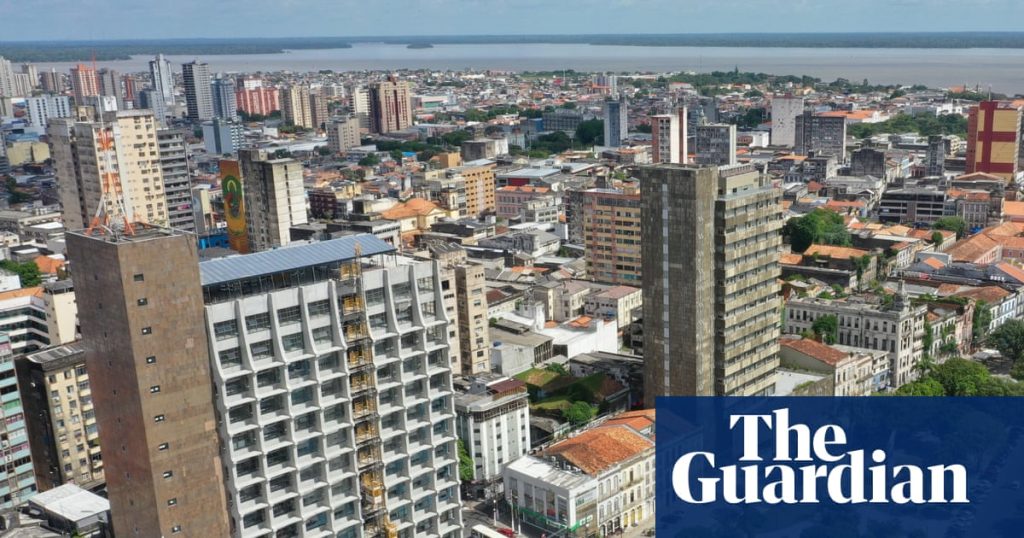The UN climate bureau has held an urgent meeting about concerns that sky-high rates for accommodation at this year’s Cop30 summit in Brazil could price poorer countries out of the negotiations.
Brazil is preparing to host Cop30 this November in the rainforest city of Belém, where representatives of nearly every government in the world will gather to negotiate their joint efforts to curb the climate crisis.
Concerns about logistics have dogged preparations for the summit. Developing countries have warned they cannot afford Belém’s accommodation prices, which have soared amid a shortage of rooms.
In an emergency meeting of the UN’s “Cop bureau” on Tuesday, Brazil agreed to address countries’ concerns about accommodation and report back at another gathering on 11 August, said Richard Muyungi, the chair of the African Group of Negotiators (AGN), who called the meeting.
“We were assured that we will revisit that … to get assurances on whether the accommodation will be adequate for all delegates,” Muyungi said afterwards.
He said African countries wanted to avoid reducing their participation because of the cost, adding: “We are not ready to cut down the numbers. Brazil has got a lot of options in terms of having a better Cop, a good Cop. So that is why we are pushing that Brazil has to provide better answers, rather than telling us to limit our delegation.”
Brazil has faced criticism for its decision to host the conference in a small city in the rainforest rather than in a bigger urban centre that already has the necessary infrastructure and hotel rooms. The country is racing to expand the 18,000 hotel beds usually available in Belém, a coastal city of 1.3 million, to accommodate roughly 45,000 people who are expected to attend Cop30.
This month, the Brazilian government said it had secured two cruise ships to provide 6,000 extra beds for delegates. It also opened bookings to developing countries at more affordable nightly rates of up to $220 (£165). That is still above the daily subsistence allowance (DSA) the UN offers some poorer nations to support their participation at Cops. For Belém, that DSA is $149.
A diplomat familiar with Tuesday’s meeting said complaints about affordability came from both developed and developing countries. Wealthier countries have been told to expect nightly accommodation costs of up to $600 – far higher than at previous Cop meetings.
The Panamanian negotiator Juan Carlos Monterrey Gómez said in June that he feared the conference “might become the most inaccessible Cop in recent memory” and that developing countries, small island states, Indigenous voices and civil society would “not be adequately represented — if represented at all”.
Media organisations, activists, NGOs and charities have also raised fears that they may not be able to participate in the conference if a solution on accommodation costs is not found.
In February, the Brazilian president, Luiz Inácio Lula da Silva, told critics that if hotels were unavailable, they should “sleep under the stars”.
An agenda for Tuesday’s meeting confirmed it was convened to address “operational and logistical preparations for the climate change conference in Belém” and the AGN’s concerns on the matter.
The planet’s most important stories. Get all the week’s environment news – the good, the bad and the essential
Privacy Notice: Newsletters may contain info about charities, online ads, and content funded by outside parties. For more information see our Privacy Policy. We use Google reCaptcha to protect our website and the Google Privacy Policy and Terms of Service apply.
after newsletter promotion
Brazil’s foreign ministry did not reply immediately to a request for comment. Officials organising the Cop30 have made repeated assurances that poorer countries will have access to accommodation they can afford.
A spokesperson for the UNFCCC, the United Nations climate body, declined to comment on the meeting.
Two UN diplomats showed Reuters quotes they had received from hotels and property managers in Belém for nightly rates of about $700 a person during Cop30.
Officials from six governments, including wealthier European countries, said they had not yet secured accommodation because of high prices, and some said they were preparing to reduce their participation.
A spokesperson for the Dutch government said it might need to halve its delegation compared with recent Cops, when the Netherlands sent about 90 people during the two-week event including envoys, negotiators and youth representatives.
This month, Poland’s deputy climate minister, Krzysztof Bolesta, said: “We don’t have accommodation. We’ll probably have to cut down the delegation to the bone. In an extreme event, maybe we will have to not show up.”

